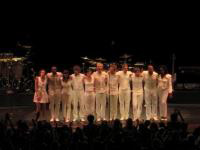David Byrne
I entered the sold out house as Byrne took the stage, the crowd erupting to their feet. He began to play “Home” off his new album without even a “Hello Asheville!” The album Everything That Happens Will Happen Today is the mutual creation of David Byrne and Brian Eno and, according to Eno, was “born as a dinner conversation.” Most songs off the new album held a slower, more thoughtful vibe than a younger Byrne might have composed. The Talking Heads albums that Brian Eno previously produced are rooted in polyrhythmic world music, and Everything That Happens Will Happen Today mirrors that complexity with a broad and stretching landscape of sound. The album was showcased at the concert but equally weighted with some of the best Talking Heads hits, which really got the diverse crowd going. When “Once in a Lifetime” started, the elderly gentleman next to me set down his binoculars and really started to groove, and the row of 20-somethings in front of me were just as taken by the music. David Byrne's vocals, energy and musicianship were strong and astounding as one could hope for. He introduced one particular song as one that had been recorded with voice samples, but he would “do his best.” The vocals were a feat not easily accomplished and came out effortlessly and perfect. David Byrne must be a strange and deep well of talent, not burning out like many musicians do after a number of successes. If you listen to Everything That Happens, you can hear that his voice has changed and the songs in him are more mature, especially in tracks like “My Big Nurse,” but it is not a weaker expression of his musical talent. In performance these new efforts are just as dazzling as “Life During Wartime.” The performance-driven choreographed extravaganza lasted one hour and 51 minutes with no set break or opening band. The dancers' role varied from esoteric dancing with office chairs to acrobatic routines to larger numbers involving the background vocalists (reminiscent of MJ's Thriller). When the stage crew exited the first time the audience raised a raucous noise that morphed into a rhythmic demand for an encore. Byrne came back promptly and played “Take Me to the River,” by far the most energetic number of the night. The audience wouldn't let him get away that easily, and so he came back and played two cuts from the new album. When the house lights came on we left grinning simultaneously having experienced something to talk about, or maybe something to good to explain. |






 David Byrne was one of eleven explosive people on stage on Sunday, September 21st at the Thomas Wolfe Auditorium. He was nestled in the front of a half moon of background vocalists, dancers and musicians. And everyone was strikingly dressed in stark white against a black curtain.
David Byrne was one of eleven explosive people on stage on Sunday, September 21st at the Thomas Wolfe Auditorium. He was nestled in the front of a half moon of background vocalists, dancers and musicians. And everyone was strikingly dressed in stark white against a black curtain.